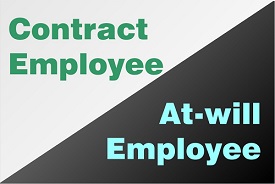Call Us At: 949-679-9909
Do You Have an Implied Contract of Employment?

Having An Implied Employment Contract Could Give You More Protections Against Wrongful Termination
 Most employees in California who do not have a written contract with their employers are at-will employees. This means that they can be fired for no reason as long as the termination does not fall within a few exceptions to this rule, such as when the firing is due to illegal discrimination under the Fair Employment and Housing Act (FEHA).
Most employees in California who do not have a written contract with their employers are at-will employees. This means that they can be fired for no reason as long as the termination does not fall within a few exceptions to this rule, such as when the firing is due to illegal discrimination under the Fair Employment and Housing Act (FEHA).
One major exception to this rule is when an implied contract is created between the employee and employer. This can give the employee powerful protections if he is terminated and allow him to sue his employer for wrongful termination.
What Is an Implied Contract?
An implied contract is one that has not been put into writing in a contract signed by the employer and employee or in a verbal agreement. It is implied from the actions and statements of the employer and employee in the course of the employee’s employment. The statements and/or actions of the employer must lead a reasonable employee to believe that he cannot be fired at will, but instead can only be terminated for good cause.
Essential Terms in an Implied Contract
Like an oral or written contract, an implied employment contract will have terms—or agreements—between the employer and employee. Essential terms to establish an implied contract of employment include:
- The implied contract between the parties contains an agreement not to terminate the employee without good cause. This is the essential term that could give an employee the right to sue for wrongful termination.
- The implied contract could govern other terms of employment—like providing health insurance benefits, paid vacation and sick time, and retirement benefits.
How Is an Implied Contract Created?
In determining whether an implied contract exists, California courts look at the conduct of the employee and employer to determine if they had any unspoken understandings or acted in ways that suggest an implied contract existed. Evidence that will be considered in deciding whether an implied contract was created includes…
- Whether the employee worked for the employer for a long period of time.
- Whether the employee had received good performance evaluations and recommendations.
- Whether the employee received pay raises, promotions, and bonuses.
- Whether the employer made statements to the employee assuring the employee that his job was secure and would continue in the future.
- Whether the employer had an employee handbook or personnel manual that stated what offenses could lead to discipline or termination of the employee.
- Whether the employer had an employee handbook or personnel manual that contained provisions for progressive discipline before an employee could be fired.
- Whether the employer has a policy or practice of only firing employees for a good reason.
- Whether the employer offers employee benefits—like medical benefits or a retirement program such as a 401(k) program—that suggest the employee will be employed long enough to receive the benefit.
- Whether the practices of the industry where the employee is employed is to enter into implied or written contracts.
What If Your Employee Handbook Says You Are an At-Will Employee?
If an employee handbook states that employees are at-will employees, this is strong evidence that no implied contract exists. However, this statement in an employee handbook or personnel manual is not fatal to a claim that there was an implied contract. Other strong evidence—such as statements by the employer, a progressive discipline procedure utilized before terminating employees, and employment benefits—can refute the claim that the employment is at-will.
How Does an Implied Contract Protect You?
If you are found to have an implied contract of employment, your employer could only fire you for good cause. This means your employer must terminate you for poor performance or have a good-faith business reason to fire you, such as laying you off for economic reasons. You could have a claim against your employer for wrongful termination if he does not have one of these legitimate reasons for terminating your employment.
Implied contracts of employment are often difficult to prove. However, an experienced employment termination attorney can help you collect the evidence you need and build your case to prove that you were wrongfully terminated. If you were illegally fired, call me today at 949-528-4220 to schedule a free, no-obligation consultation to learn how I can help you get the justice you deserve.
RELATED LINKS
No Legal fees unless you recover
The law offices of Corbett H. Williams takes most employee cases on a contingency fee basis
meaning that if we take your case, you pay nothing unless we recover for you.
Contact Us Today For a Free Case Evaluation Reliable & Trusted
If you are the victim of unlawful employment practices, including wrongful termination, sexual harassment, discrimination, or have not been paid all wages and benefits you are entitled to, the Law Offices of Corbett H. Williams can help. Call us today at 949-528-4220, or take a moment to fill out an online contact form for a prompt response. Delay could result in the loss of your claim, so don’t wait.
Request Your
Free Consultation
Fields Marked With An “ * ” Are Required

The Law Offices of Corbett H. Williams is always prepared to get clients started down the road to a more secure future. Take the first step and contact the firm today. The attorney will take care to answer questions and help decide what the most effective next step can be.

